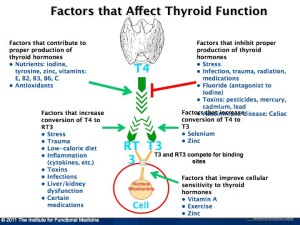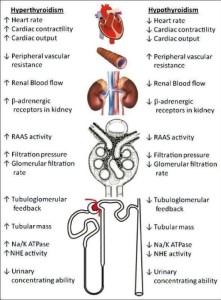Part II Thyroid Awareness Month – Hypo and Hyper thyroidism.
Hypothyroidism
This occurs when your thyroid produces too little thyroid hormone, a condition that is often linked to iodine deficiency.
Dr. David Brownstein, a board-certified holistic practitioner who has been working with iodine for the last two decades, claims that over 95 percent of the patients in his clinic are iodine-deficient.
In addition, 10 percent of the general population in the United States, and 20 percent of women over age 60, have subclinical hypothyroidism,2 a condition where you have no obvious symptoms and only slightly abnormal lab tests.
However, only a marginal percentage of these people are being treated. The reason behind this is the misinterpretation and misunderstanding of lab tests, particularly TSH (thyroid stimulating hormone). Most physicians believe that if your TSH value is within the “normal” range, your thyroid is fine. But as I always say, the devil is in the details. More and more physicians are now discovering that the TSH value is grossly unreliable for diagnosing hypothyroidism.
How to Know If You Have Hypothyroidism
Identifying hypothyroidism and its cause is tricky business. Many of the symptoms of hypothyroidism are vague and overlap with other disorders. Physicians often miss a thyroid problem since they rely on just a few traditional tests, leaving other clues undetected.
The most sensitive way to find out is to listen to your body. People with a sluggish thyroid usually experience:
-
- Lethargy – Fatigue and lack of energy are typical signs of thyroid dysfunction. Depression has also been linked to the condition. If you’ve been diagnosed with depression, make it a point that your physician checks your thyroid levels.Some of the obvious signs of thyroid fatigue include:
- It’s essential to note that not all tiredness or lack of energy can be blamed on a dysfunctional thyroid gland. Thyroid-related fatigue begins to appear when you cannot sustain energy long enough, especially when compared to a past level of fitness or ability. If your thyroid foundation is weak, sustaining energy output is going to be a challenge. You will notice you just don’t seem to have the energy to do the things like you used to.
-
- Feeling like you don’t have the energy to exercise, and typically not exercising on a consistent basis
- A heavy or tired head, especially in the afternoon; your head is a very sensitive indicator of thyroid hormone status
- Falling asleep as soon as you sit down when you don’t have anything to do
- Weight gain– Easy weight gain or difficulty losing weight, despite an aggressive exercise program and watchful eating, is another indicator.
- Rough and scaly skin and/or dry, coarse, and tangled hair– If you have perpetually dry skin that doesn’t respond well to moisturizing lotions or creams, consider hypothyroidism as a factor.
- Hair loss– Women especially would want to pay attention to their thyroid when unexplained hair loss occurs. Fortunately, if your hair loss is due to low thyroid function, your hair will come back quickly with proper thyroid treatment.
- Sensitivity to cold– Feeling cold all the time is also a sign of low thyroid function. Hypothyroid people are slow to warm up, even in a sauna, and don’t sweat with mild exercise.
- Low basal temperature – Another telltale sign of hypothyroidism is a low basal body temperature (BBT), less than 97.6 degrees Fahrenheit averaged over a minimum of three days. It is best to get a BBT thermometer to assess this.
- Hyperthyroidism Several treatment options are available if you have hyperthyroidism. Doctors use anti-thyroid medications and radioactive iodine to slow the production of thyroid hormones. Sometimes, treatment of hyperthyroidism involves surgery to remove all or part of your thyroid gland. Although hyperthyroidism can be serious if you ignore it, most people respond well once hyperthyroidism is diagnosed and treated. Hyperthyroidism can mimic other health problems, which may make it difficult for your doctor to diagnose. It can also cause a wide variety of signs and symptoms, including:
- Hyperthyroidism (overactive thyroid) is a condition in which your thyroid gland produces too much of the hormone thyroxine. Hyperthyroidism can accelerate your body’s metabolism significantly, causing sudden weight loss, a rapid or irregular heartbeat, sweating, and nervousness or irritability.
- Any of these symptoms can be suggestive of an underactive thyroid. The more of these symptoms you have, the higher the likelihood that you have hypothyroidism. Furthermore, if you have someone in your family with any of these conditions, your risks of thyroid problems become higher.
- Sudden weight loss, even when your appetite and the amount and type of food you eat remain the same or even increase
- Rapid heartbeat (tachycardia) — commonly more than 100 beats a minute — irregular heartbeat (arrhythmia) or pounding of your heart (palpitations)
- Increased appetite
- Nervousness, anxiety and irritability
- Tremor — usually a fine trembling in your hands and fingers
- Sweating
- Changes in menstrual patterns
- Increased sensitivity to heat
- Changes in bowel patterns, especially more frequent bowel movements
- An enlarged thyroid gland (goiter), which may appear as a swelling at the base of your neck
- Fatigue, muscle weakness
- Difficulty sleeping
- Skin thinning
- Fine, brittle hair
- Graves ophthalmopathy
- Signs and symptoms of Graves’ ophthalmopathy include:
- Sometimes an uncommon problem called Graves’ ophthalmopathy may affect your eyes, especially if you smoke. In this disorder, your eyeballs protrude beyond their normal protective orbits when the tissues and muscles behind your eyes swell. This pushes the eyeballs forward so far that they actually bulge out of their orbits. This can cause the front surface of your eyeballs to become very dry. Eye problems often improve without treatment.
- Older adults are more likely to have either no signs or symptoms or subtle ones, such as an increased heart rate, heat intolerance and a tendency to become tired during ordinary activities. Medications called beta blockers, which are used to treat high blood pressure and other conditions, can mask many of the signs of hyperthyroidism.
- Protruding eyeballs
- Red or swollen eyes
- Excessive tearing or discomfort in one or both eyes
- Light sensitivity, blurry or double vision, inflammation, or reduced eye movementIf you experience unexplained weight loss, a rapid heartbeat, unusual sweating, swelling at the base of your neck or other symptoms associated with hyperthyroidism, see your doctor. It’s important to completely describe the changes you’ve observed, because many signs and symptoms of hyperthyroidism may be associated with a number of other conditions.Causes: A number of conditions, including Graves’ disease, toxic adenoma, Plummer’s disease (toxic multi-nodular goiter) and thyroiditis, can cause hyperthyroidism.
- If you’ve been treated for hyperthyroidism or currently are being treated, see your doctor regularly as advised so that he or she can monitor your condition.
- When to see a doctor
Risk factors-Hyperthyroidism, particularly Graves’ disease, tends to run in families and is more common in women than in men. If another member of your family has a thyroid condition, talk with your doctor about what this may mean for your health with what you need to do.


great article benificial to us
Thank you!